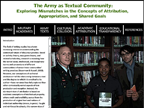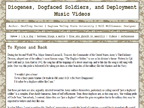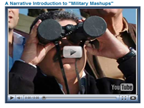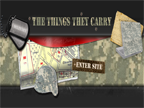dot mil: Rhetoric, Technology, and the Military
14.3 Summer 2010
Logging On
Mike Edwards and Alexis Hart, Guest Editors
-
Topoi
-
The Army and the Academy as Textual Communities: Exploring Mismatches in the Concepts of Attribution, Appropriation, and Shared Goals
Chris Anson and Shawn Neely

This webtext examines the practices of authorial attribution in textual production in higher education (where notions of individual authorship and intellectual property prevail, particularly at military academies) and in the military (which has a more public conception of authorship).
-
Diogenes, Dogfaced Soldiers, and Deployment Music Videos
Geoffrey Carter and Bill Williamson

This webtext explores the cynical/kynical humor of soldier videos, suggesting that amateur videos paradoxically both undercut authority and honor effective leaders, both make light of and also publicly reveal deployment hardships, both distance the performers from military groupthink and celebrate unit camaraderie.
-
Military Mashups: Remixing Literacy Practice
Steven Fraiberg

Through a series of video essays, Fraiberg examines how the codes of the military are "mashed" or remixed into everyday reading, writing, and speaking practices in Israel.
-
What a Painter of 'Historical Narrative' Can Show Us about War Photography
Paul X. Rutz

Rutz presents samples of artist Steve Mumford's paintings from the Iraq war zone alongside photos or other war images and asks readers to examine notions of journalism, photojournalism, and the practices of representing war.
-
-
Praxis
-
Telling War Stories: The Things They Carry
Paige Paquette and Mike Warren

This webtext reveals two modern-day methods for soldiers to share their war stories: 1) soldiers sharing their stories with cadets from West Point through a project linking veterans from the Global War on Terror with composition students; and 2) soldiers learning in online composition classrooms designed specifically for them.
-
-
Disputatio
-
Don't Ask, Don't Tell
Dawn Penich-Thacker

Penich-Thacker points to the increasing digital presence of the U.S. military, not only on official dot.mil sites but also on commercial social networking sites, and suggests that the interactions and intersections of military and civilian personnel online challenge the notion of "fundamental differences" between these populations.
-
Interviews
-
So-Called Bloodless Wars
Carl Whithaus interviews Noam Chomsky
This interview with Chomsky covers a range of topics regarding the uses of technology by the United States military and the Israeli military, including the use of information technology for surveillance, communication, and control of civilian populations.
-
Rhetoric, The Military, and Artificial Intelligence
Ryan Trauman interviews Hugh Burns
This interview traces Burns's transition from military officer to professor, provides insight for junior scholars in computers and composition, and seeks connections among military training, artificial intelligence, and teaching with technology.
-
A Soldier Interacting, Without Mediation
Mike Edwards and Alexis Hart interview Lt. Gen. William B. Caldwell IV
Lt. Gen. Caldwell is a three-star general who has publicly promoted the use of digital media technologies—from blogs to YouTube to Twitter—by military personnel of all ranks. He discusses training, security, and other issues associated with the use of information technologies by active-duty military personnel.
-
Index: All Kairos Interviews

